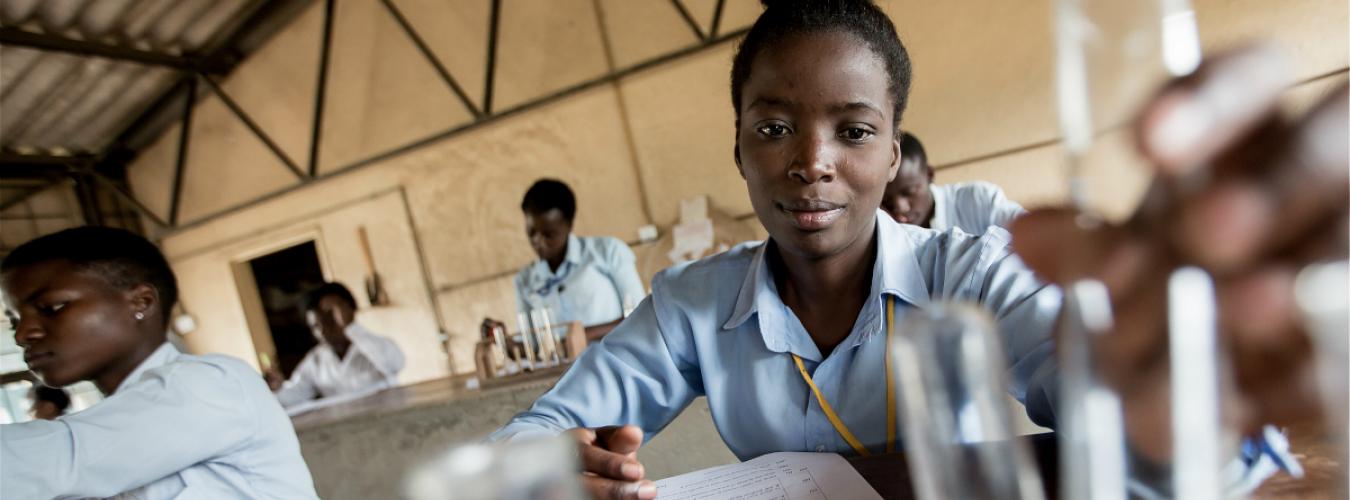On International Day of Women and Girls in Science, OACPS Secretary-General calls for women’s equal participation in science
 STATEMENT BY THE SECRETARY-GENERAL OF THE ORGANISATION OF AFRICAN, CARIBBEAN AND PACIFIC STATES ON THE OCCASION OF THE INTERNATIONAL DAY OF WOMEN AND GIRLS IN SCIENCE
STATEMENT BY THE SECRETARY-GENERAL OF THE ORGANISATION OF AFRICAN, CARIBBEAN AND PACIFIC STATES ON THE OCCASION OF THE INTERNATIONAL DAY OF WOMEN AND GIRLS IN SCIENCE
Brussels, 11 February 2022/OACPS: On the occasion of the commemoration of the International Day of Women and Girls in Science, on 11 February, H.E. Mr Georges Rebelo Pinto Chikoti, Secretary-General of the Organisation of African, Caribbean and Pacific States (OACPS), calls for a recognition of the role of women as co-creators of the new world being shaped by science, an issue which is very relevant to the theme of this year’s celebration, “Equity, Diversity, and Inclusion: Water Unites Us”.
According to UN reports, billions of people around the world will be unable to access safely-managed household drinking water, sanitation, and hygiene services in 2030 unless progress rates quadruple. And the challenge is compounded by climate change. The OACPS Secretary-General reiterates that women scientists can be major agents of change, and can contribute to accelerating progress towards the achievement of Sustainable Deveopment Goal (SDG) 6 (Clean Water and Sanitation), if they are empowered to do so.
While women are at the forefront of climate change and climate mitigation, both as they provide for their households and as change makers, despite encouraging progress in the last decade, the gender gap in science still holds women back from realising their full potential.
Citing the 2021 UNESCO[i] Science Report, the Secretary-General notes that women only account for one in three researchers and they have very low rates of publications and success in competitive grants. Even though women represent 35% of Science, Technology, Engineering and Mathematics (STEM) students globally, and have achieved parity in life sciences in many countries, they still remain a minority in engineering (28% of engineering graduates), computing (40% of graduates in computer-related fields), physics and mathematics. And they make up just 22% of professionals working in the field of Artificial Intelligence (AI) and 15% of all the data scientists in the world.
Due to social norms and stereotypes, social pressures and other gender-based inequalities, women are also insufficiently represented in leading positions where they could determine research agendas and priorities, and bring unique perspectives, knowledge, and skills, especially on issues such as food security, climate change and biodiversity loss.
Women’s equal participation in science is the game-changer that is urgently needed. For this to happen, Secretary-General Chikoti invites everyone to consider how best they can contribute to levelling the playing field with active gender-transformative policies and programmes, recognizing women’s contributions in science, smashing stereotypes, defeating discrimination, and encouraging a gender-sensitive approach at every step of the scientific process to avoid biases and produce a more relevant science with greater impact.
Secretary-General Chikoti further underlines the necessity to promote positive role models of women scientists, networking and mentorships, and already spark interest in STEM careers in early school years, to further engage women and girls in science.
On this day that focuses attention on the role of women and girls in the sciences, H.E. Georges Rebelo Pinto Chikoti calls for the empowerment and support of women and girls throughout their careers, notably by specific measures, such as removal of age limits for fellowships and grants to take into account career breaks for rearing children. And, just as essentially, to empower them to lead and innovate, through capacity-building programs.
Photo: un.org
